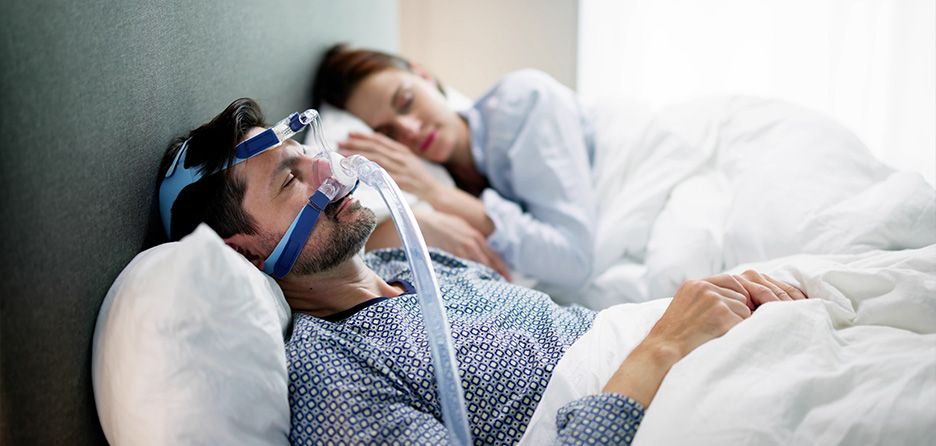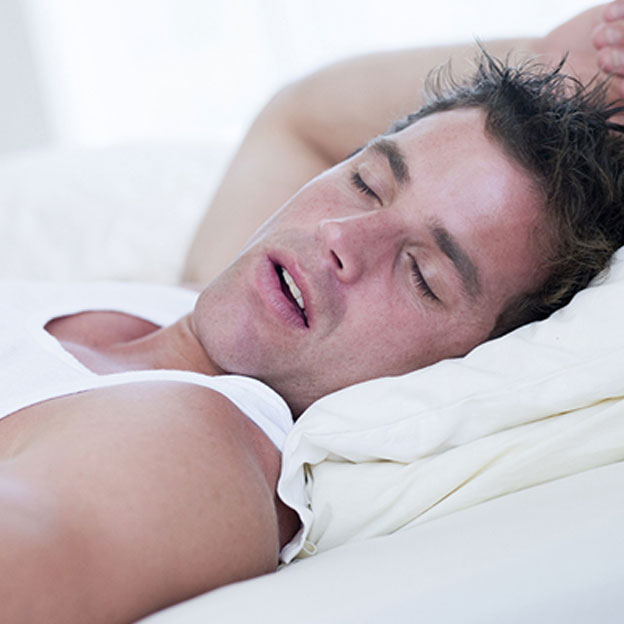If you often feel exhausted or irritable, have trouble concentrating, or wake up choking or gasping for breath, you may be suffering from sleep apnea, a condition that affects around one in ten people.1 Learn more about this health problem that can dramatically impact your quality of life.

1
What is sleep apnea?
Sleep apnea is a respiratory disorder in which breathing involuntarily stops during sleep for up to 30 seconds at a time.2 These interruptions cause people with sleep apnea to wake up for a few seconds multiple times an hour, which disrupts their sleep and diminishes their quality of life.
2
What are the 3 types of sleep apnea?
There are three main types of sleep apnea. Each type requires a different treatment approach.
- Obstructive sleep apnea (OSA)
This is the most common form of sleep apnea. It occurs when the upper respiratory tract is blocked, often due to the muscles in the throat relaxing. - Central sleep apnea (CSA)
Central sleep apnea is less common. It occurs when the brain fails to send the signals that tell your body to breathe while you’re asleep. - Mixed sleep apnea
People with mixed sleep apnea exhibit symptoms of both obstructive and central sleep apnea. While it is rare, it is also difficult to treat.
A less-severe condition called upper airway resistance syndrome (UARS) can also cause symptoms similar to those of sleep apnea. This condition does not cause complete apneas, but it reduces airflow during sleep and can also impact sleep quality.
3
What triggers sleep apnea?
Anyone can develop sleep apnea. However, the following factors can increase your risk of developing this condition:
- Male gender
- Age over 40
- Obesity (fat around the neck may constrict the airways)
- Family history of sleep apnea
- Large neck circumference (over 43 cm in men and over 40 cm in women)
- Receding chin
- Large tonsils
- Nasal congestion
- Smoking
- Regular alcohol consumption
Medications that may cause sleep apnea
Certain medications that cause the throat muscles to relax, such as sleeping pills and muscle relaxants, can also increase the risk of sleep apnea. Don’t hesitate to ask your pharmacist for advice about the side effects of your medications.
4
How do you know if you have sleep apnea?
Recognizing the symptoms
People with sleep apnea can exhibit a variety of symptoms, sometimes without realizing it. In fact, a family member is often the first one to notice symptoms. One of the most common signs of sleep apnea is frequently waking up choking or gasping for air. Although those affected are not always aware of it, their symptoms are often the result of poor sleep quality.
Here are the main signs to watch out for:
- Severe fatigue
- Snoring
- Headaches
- Irritability or mood swings
- Memory issues
- Poor performance at work
- Waking up feeling short of breath or like you’re choking
- Night sweats
- Frequent need to urinate at night
Sleep apnea screening test
If you think you might have sleep apnea, it’s important to consult a doctor who can assess your condition and, if necessary, order a test that will be done at a hospital or private clinic. These facilities have multidisciplinary teams that include pulmonologists and respiratory therapists.
There are two main tests used to screen for sleep apnea:
- Polysomnography (sleep study)
This comprehensive test requires you to stay overnight at a hospital or sleep centre. It records several body functions, including brain activity and eye movement. - Respiratory polygraphy
This test is less complex and can be done at home. It measures breathing and oxygen levels.
These tests enable your doctor to make a precise diagnosis, which is crucial for determining the most appropriate treatment. A follow-up appointment is recommended to interpret the results and choose the best treatment option.
5
What treatments are available for sleep apnea?
Lifestyle changes
Sleep apnea symptoms can be controlled by adopting healthy lifestyle habits, such as:
- Maintaining a healthy weight
- Consuming alcohol in moderation
- Quitting smoking
- Exercising
- Cutting back on caffeine
- Keeping to a regular sleep schedule
- Sleeping on your side rather than your back
CPAP machine
Your doctor may recommend treatment with a continuous positive airway pressure (CPAP) machine. A CPAP machine uses a hose connected to a mask to deliver a continuous stream of air through your nose and/or mouth. This keeps your airways open, preventing interruptions in breathing.
Other treatment options
There are also dental appliances that can help treat sleep apnea. These devices move your jaw and tongue forward to prevent them from blocking your airway. Finally, there are certain surgeries that can treat the symptoms of sleep apnea.

6
Can you die from severe sleep apnea?
While sleep apnea does not directly cause death, if its symptoms are left untreated, there can be serious complications.
Understanding the health impacts of apnea
Sleep apnea can increase your risk of high blood pressure, heart disease, stroke, and depression. It can also lead to road accidents or workplace injuries related to chronic fatigue.2 It’s important to consult a health care professional if you show signs of apnea in order to reduce these risks.
Getting back to a good night’s sleep
Sleep apnea can affect your daily life, but early diagnosis and appropriate treatment can make a big difference. Consult a health care professional to restore your sleep and improve your well-being. By taking care of your sleep, you will also optimize your overall health.
1 SOURCE: https://poumonquebec.ca/en/maladies/sleep-apnea/
2 SOURCE: https://www.canada.ca/en/public-health/services/chronic-diseases/sleep-apnea.html

